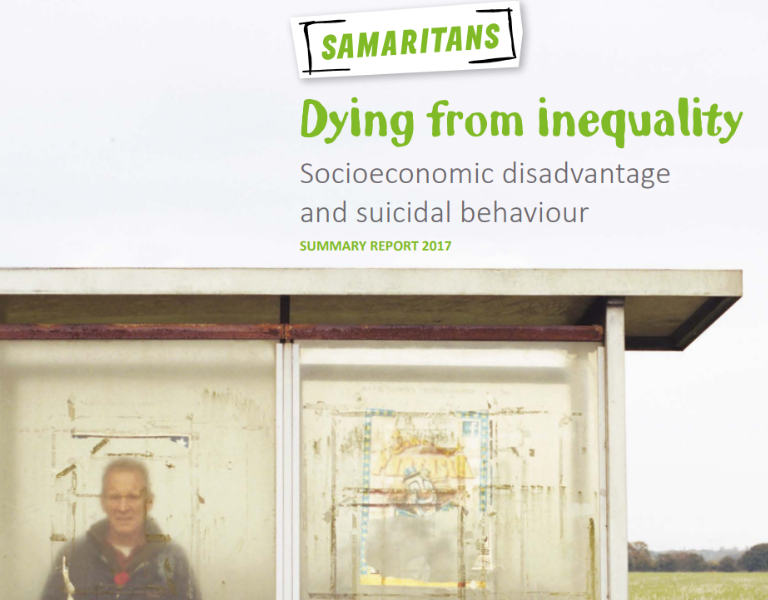
Samaritans Scotland
Samaritans Scotland and the University of Strathclyde are conducting research into insecure work, economic insecurity and suicidality. If you are interested in taking part or finding out more please contact Dave Morris at d.morris@samaritans.org
This Challenge Poverty Week it’s vital that we recognise that suicide is an inequality issue. The latest suicide statistics show that people living in Scotland’s most deprived areas are 2.6 times more likely to die by suicide than those living in the least deprived areas. Although suicide is complex and is rarely caused by one thing we know that people on the lowest incomes have a higher suicide risk than those who are wealthier, and people on lower incomes are also the most affected by rising prices and other types of financial hardship.
Insecure work and low pay are drivers that keep people trapped in poverty. People who are unemployed are two to three times more likely to die by suicide than those in employment. But it’s not only unemployed people who are at increased risk. Evidence on the association between working conditions, debt and suicide suggests that increased, involuntary part-time work, job insecurity and workplace downsizing are risk factors for suicidal behaviour. Employees who keep their jobs during a workplace downsizing may experience job insecurity and negative relationships with their peers, as well as stress from an increased workload. People who are self-employed can also be affected if demand for their business decreases.
It's also important to recognise that inequality impacts people and communities across generations. People who experience childhood adversity are more likely to become socioeconomically disadvantaged later in life. For example, unemployment is more likely among those who have experienced adverse childhood experiences including experience of child poverty.
However work can also be a protective factor against suicide. Good workplaces protect our wellbeing by providing us with a purpose, giving us a supportive network of colleagues and paying a living wage which can help us to feel secure in the long term. Employment is just one example of the importance of developing a whole of society approach to suicide prevention.
By building a society that promotes protective factors and tackles risk factors we can move towards a Scotland where fewer people die by suicide. Samaritans Scotland are partnering with Scottish Government to help to deliver Creating Hope Together, Scotland’s suicide prevention strategy. This work will involve us looking across government and across society and identifying areas where the most difference can be made to prevent suicide and stop people from getting to the point of suicidal crisis.
Evidence shows that action to get people into good work is effective in reducing inequalities and suicide risk. For example, Samaritans research Dying from Inequality shows that active labour market programmes can help reduce suicidal behaviour. Programmes aimed at reintegrating unemployed people as quickly as possible into the labour market are likely to shorten the duration of unemployment and reduce social isolation by involving participants in training or education. They can help people find employment which is a source of social contacts, status and self-esteem, thus reducing the risk of suicidal behaviour.
Alongside ensuring access to high quality employment, it’s important that we ensure those who are unable to work are equally able to have an income and experience long term security. Our research shows that countries with more generous unemployment benefits experience lower recession related rises in suicide. However, means-tested benefits may actually contribute to suicidal behaviour if recipients feel stigmatised. A system of social security which eases financial worries while minimising feelings of shame, worthlessness and loss of status can reduce feelings of insecurity and entrapment that we know are risk factors for suicide.
We need to recognise the impacts, both positive and negative, that our relationships with work have on our wellbeing. Access to well-paid, meaningful and fulfilling work is a key aspect of individual wellbeing and of ensuring that every part of our society is contributing to our vision of a Scotland where fewer people die by suicide.
As part of our work to achieve this vision we are partnering with the University of Strathclyde to carry out research exploring the relationship between financial insecurity, insecure employment and suicidality. We will be speaking to people with experience of insecure work and suicidality and allowing their experiences to shape our policy and campaigns work to ensure that experiences of employment across Scotland protect against suicide.
If you would like to learn more about our research work please contact Dave Morris at d.morris@samaritans.or


Enter your email address to receive regular e-updates about our work. If at any time you want to stop receiving these, simply contact us. We’ll keep your details safe and won’t share them with any other organisations for their marketing purposes. For full details see our Privacy Policy.